How to Focus on Big-Picture Wellness
As consumers we love to hear that bold gestures like elimination diets, cleanses and miracle supplements can transform our bodies and our lives. Doctors know better. “We like clear-cut, black and white solutions — this is good, that is bad; eat this, not that. It makes decision-making simple and easy. However, the real world is much more nuanced,” says Gary Deng, M.D., Ph.D., the medical director of integrative medicine at Memorial Sloan Kettering Cancer Center in New York City.
“For example, a little bit of sugar is harmless. In fact, our body will generate sugar even when we don’t eat any,” Deng explains. "On the other hand, too much sugar over a long period is indeed harmful. Another example is that if you are sedentary for a whole month then take a long run, it doesn’t do you much good. On the other hand, if you exercise regularly most days, taking a break for a day won’t do you any harm. Focusing on the big picture instead of minutiae is important. Plus, it frees us from unnecessary anxiety.”









